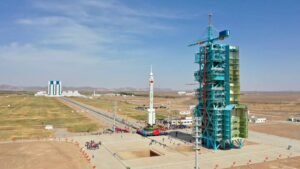At a press conference on Wednesday, the China Manned Space Agency (CMSA) announced the 3 astronauts Ye Guangfu, Li Cong and Li Guangsu comprises the crew of the Shenzhou 18 spaceflight mission. The crew will be commanded by Ye Guanfu.
The spaceship is set to launch at 8:59 pm (CST) on Thursday, April 25 from the Jiuquan Satellite Launch Center in northwest China.

The three member crew is being sent to space to take “good care” of the Tiangong Space station and add to the achievements of Chinese spaceflight history. The crew has made comprehensive, systematic and in-depth preparations for this mission, focusing on extravehicular activities (EVAs), emergency response, space station management, equipment maintenance and experimental operation.
The Shenzhou-18 crew is scheduled to return to the Dongfeng landing site in north China’s Inner Mongolia Autonomous Region, late October this year.
Meet the Space Crew
Ye Guangfu: this 43 year old astronaut has made his return with this new mission. Earlier, he was a crew member of the Shenzhou 13 mission from October 2021 and April 2022. Given his experience, he will lead the two new members of the Shenzhou-13 mission.
Li Cong: As the youngest member of the crew, Li Cong has earned the confidence of his commander Ye. He will provide his valuable inputs to the team, leading to a successful mission.
Li Guangsu: Li Guangsu will perform space experiments and tests in cutting-edge fields such as aerospace medicine, basic physics, material science and life science. “I am looking forward to the speed and passion of 7.9 kilometers per second, the special experience of weightlessness, and the wonderful feeling of flying without wings,” he informed the media.
Shenzhou-18 Objectives
Shenzhou-18 is a 6 month stay in space mission. The crew will oversee the arrival of Tianzhou-8 cargo craft and Shenzhou-19 crewed spaceship during their stay. Their task is to carry out more than 90 experiments in the fields of basic physics in microgravity, space material science, space life science, space medicine and space technology.
“The country’s first in-orbit aquatic ecological research project will be implemented during the mission. Using zebrafish and goldfish algae to establish a self-cycling aquatic ecosystem in orbit, the project aims to make a breakthrough in the cultivation of vertebrates in space”, Lin Xiqiang deputy director of CMSA said.
“The world’s first in-orbit stem cell study on the plant’s stem tips will be made to explore plant evolutionary adaptation to gravity and provide theoretical support for space cropping”, he added.
The astronauts will also install space debris protection reinforcements for extravehicular piping, cables and critical equipment, and carry out extravehicular inspections, as appropriate, to further ensure the safety of the space station.











